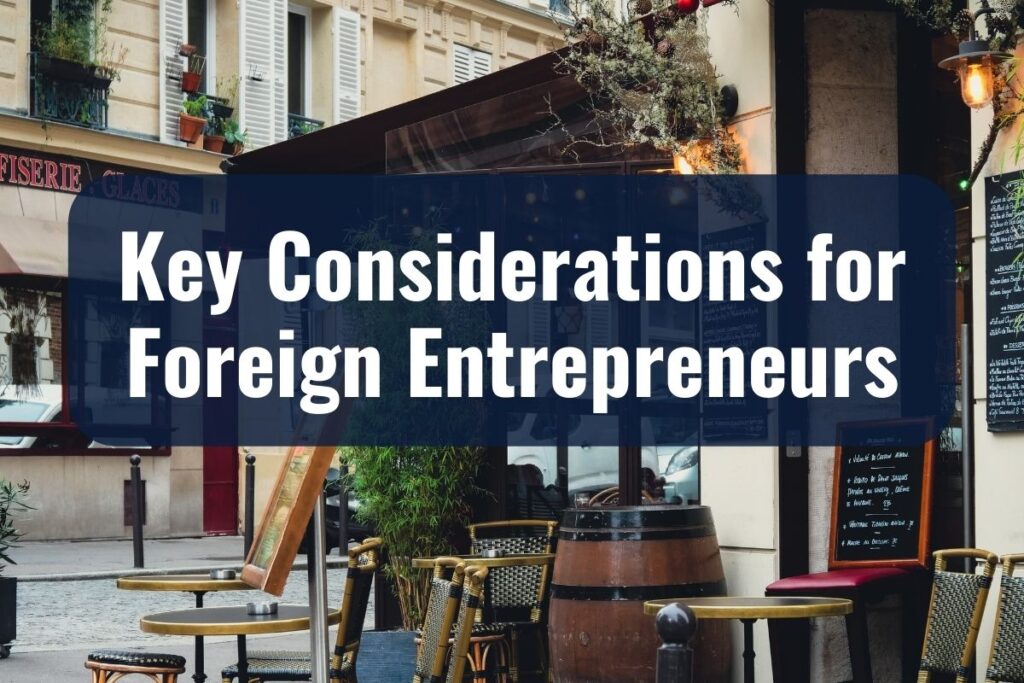While France offers a fertile ground for businesses, it’s crucial for foreign entrepreneurs to equip themselves with knowledge. Understanding the regulatory environment, the various types of business entities, and the cultural nuances can make the difference between success and struggle. This article aims to shed light on the essential aspects of starting a business in France, offering clarity amidst the complexities.
KEY TAKEAWAYS
- France offers a diverse array of business entities tailored for different entrepreneurial needs.
- Adequate preparation, from market research to business registration, is crucial for a smooth business launch.
- For foreign entrepreneurs, understanding cultural and linguistic nuances can be pivotal for success.
- Various funding and support mechanisms exist in France to propel businesses forward.
- While challenges like complex regulations and cultural differences exist, they can be navigated with the right strategies and support.
Why Start a Business in France?
Embarking on the journey of establishing a business in a foreign land requires thorough research and understanding. The question arises: why choose France? Below are compelling reasons that make France a top choice for many global entrepreneurs.
Strategic Location in Europe
France’s geographical positioning is undeniably strategic. Nestled in the heart of Western Europe, it serves as a gateway to several European markets. With its efficient transportation system, including high-speed rails and major airports, businesses can quickly access neighboring countries such as Germany, Spain, Italy, and the United Kingdom, facilitating cross-border trade and collaborations.
Rich Cultural History and Strong Consumer Base
The French take immense pride in their culture, and it’s evident in the way they value quality, craftsmanship, and authenticity. This translates into a consumer base that appreciates and is willing to invest in premium products and services. Tapping into this market means businesses have the opportunity to cater to a discerning audience, enhancing brand reputation and loyalty.
Access to a Skilled Workforce
One of the pillars of France’s economic strength is its emphasis on education and professional training. The country is home to renowned universities and technical institutes, producing a steady stream of talented professionals every year. Whether you’re in tech, fashion, gastronomy, or any other industry, France provides a pool of skilled individuals ready to contribute to your business’s growth.
Government Incentives for Startups and Entrepreneurs
To foster innovation and entrepreneurship, the French government has put forth various incentives and schemes. From tax breaks for new businesses to grants for research and development, foreign entrepreneurs can find substantial support. Moreover, initiatives like La French Tech, a government-backed movement bolstering the French startup ecosystem, provide networks, resources, and events to help startups thrive.
Types of Business Entities in France

Diving into the French business landscape requires a clear understanding of the various business structures available. Each entity type has its advantages and is tailored to fit different business needs. Let’s delve into the common forms of business entities in France, ensuring you find the right fit for your entrepreneurial journey.
| Business Entity | Key Advantages | Important Considerations |
| Sole Proprietorship | Simplified procedures; Direct control | Personal liability for business debts |
| Limited Liability Company (SARL) | Asset protection; Flexible management | Min. one shareholder; Initial capital requirement |
| Joint Stock Company (SA) | Raise capital through shares; Operational flexibility | Rigorous admin; Min. two shareholders; Higher capital |
| Simplified Joint Stock (SAS) | Flexible management; Custom by-laws | Financial audits if thresholds exceeded |
Sole Proprietorship (Entreprise individuelle)
For those who wish to embark on a solo venture, the sole proprietorship is a straightforward option. This structure is particularly suited for individuals who want to manage their business activities without the complexities of company formation.
- Advantages: Simplified administrative procedures, direct control over business decisions, and uncomplicated taxation.
- Considerations: Personal liability for business debts, which means your assets could be at risk in case of business insolvency.
Limited Liability Company (SARL)
The SARL, equivalent to the LLC in many countries, is one of the most popular choices for small to medium-sized businesses in France. It provides the advantage of limited liability while remaining relatively easy to set up.
- Advantages: Protection of personal assets from business liabilities, flexibility in management, and profits taxed at the personal income level for shareholders.
- Considerations: Requirement of at least one shareholder and a minimum initial capital.
Joint Stock Company (SA)
Larger enterprises and those looking to raise capital through public markets often opt for the SA. It’s a structure that suits businesses with bigger ambitions and a broader scope.
- Advantages: Ability to raise capital by issuing shares to the public, recognized structure for international investors, and operational flexibility.
- Considerations: More rigorous administrative and reporting requirements, requirement of at least two shareholders, and a higher minimum capital requirement.
Simplified Joint Stock Company (SAS)
The SAS is a modern addition to the French business landscape, offering flexibility in management and organization. It’s particularly popular among startups and joint ventures between French and foreign companies.
- Advantages: Flexible management structure, possibility to draft custom by-laws, and no minimum capital requirement.
- Considerations: Financial statements must be audited if certain thresholds are exceeded, and it’s essential to ensure by-laws are well-drafted to prevent potential conflicts.
Choosing the right business entity is a foundational decision in your French entrepreneurial adventure. It’s crucial to align the choice with your business goals, financial considerations, and growth aspirations. Armed with this knowledge, you’re one step closer to making an informed decision and establishing your dream venture in the heart of Europe.
Steps to Starting a Business in France
Launching a business in France is a structured process, which, when navigated systematically, can be smooth and rewarding. Let’s break down the journey into phases, shedding light on each step to ensure your business establishment is efficient and compliant.
Preparation Phase
Market Research and Business Plan Creation
Before diving into the intricacies of registration and legalities, it’s paramount to understand your market. Delve into industry trends, competitor analysis, and consumer behaviors. Armed with these insights, draft a robust business plan that will serve as your roadmap and potentially aid in securing funding.
Deciding on the Business Entity Type
As discussed earlier, France offers a variety of business structures. Choose the one that best aligns with your business goals, financial capacity, and risk appetite.
Registration Phase
Obtaining a Unique Identification Number (SIREN)
All businesses in France require a SIREN number, a unique identifier issued by the INSEE (National Institute of Statistics and Economic Studies). It’s essential for tax purposes and official paperwork.
Registering with the French Commercial Court
Depending on your chosen business entity, you’ll need to register with the appropriate commercial court registry. This step formalizes your business’s existence and provides legal recognition.
Applying for Necessary Licenses or Permits
Certain sectors, like hospitality, health, or finance, might need specific licenses or permits. Ensure you’re aware of and obtain any required documentation to operate legally.
Operational Phase
Setting Up a Business Bank Account
A distinct business bank account is vital for managing finances, ensuring transparency, and building a financial history. Most banks in France offer specialized services for businesses, making this process relatively straightforward.
Hiring Employees and Understanding Labor Laws
If your business model involves hiring, it’s crucial to acquaint yourself with French labor laws. These cover everything from contracts to working hours and employee rights. Ensuring compliance will not only protect your business but will foster a positive working environment.
Managing Taxes and Social Contributions
The French tax system, while comprehensive, is navigable with the right knowledge. Be aware of your tax obligations, both at the business and personal levels, and stay updated on any changes or new regulations. Additionally, businesses contribute to the social security system, so understanding these obligations is equally essential.
Key Considerations for Foreign Entrepreneurs

Embarking on the entrepreneurial journey in France as a foreigner brings its unique set of challenges and opportunities. While the promise of the French market is undeniably enticing, there are vital considerations to keep in mind to ensure a seamless transition and successful business operations.
Language Barrier: Importance of Bilingual Staff or Consultants
Though many in the business world speak English, the official language of France is French. Important documents, negotiations, and everyday interactions might require a grasp of the language. If you’re not fluent, consider hiring bilingual staff or working with consultants to bridge this gap. This will not only ease operations but will also build trust with local clients and partners.
Cultural Differences: Adapting Business Strategies to French Norms
France, with its rich cultural tapestry, has distinct business etiquettes and norms. For instance:
- Building personal relationships is crucial. The French value trust and often prefer face-to-face meetings before making decisions.
- A work-life balance is revered. Understanding the French working hours and vacation norms can prevent scheduling conflicts and foster a harmonious business environment.
Being aware of and respecting these nuances can provide a competitive edge and facilitate smoother interactions.
Regulatory Environment: Keeping Updated with Changes in Business Laws and Regulations
French regulations, while comprehensive, are known for their periodic changes. It’s essential to stay informed about any updates, especially those pertinent to your industry. Joining local business associations, subscribing to industry newsletters, or partnering with a local business consultancy can aid in this.
Funding and Support
A critical aspect of initiating a business venture, especially in a foreign land, is securing the right funding and tapping into the available support mechanisms. France, with its commitment to fostering a dynamic entrepreneurial ecosystem, offers various avenues to help businesses get off the ground and achieve sustainable growth.
Local and Government Grants Available for Startups
The French government, aware of the potential of new businesses to boost the economy, provides numerous grants and subsidies. These range from innovation grants for technology-based startups to incentives for businesses setting up in specific regions or sectors.
Bpifrance: This public investment bank offers an array of financial products, including loans, guarantees, and equity investments, tailored for startups and SMEs.
French Tech Ticket: A program specifically designed for foreign tech entrepreneurs. It provides financial support, mentoring, and a fast-track procedure for the French Tech Visa.
Business Incubators and Accelerators in France
Incubators and accelerators can be invaluable for startups, offering not just funding but also mentorship, office space, and networking opportunities.
Station F: Based in Paris, this is one of the world’s largest startup campuses, housing various programs and providing resources for new businesses.
La French Tech: A government-backed initiative supporting the startup ecosystem in France, connecting entrepreneurs with mentors, investors, and potential partners.
Access to Venture Capital and Angel Investors
For startups with higher growth potential, venture capital (VC) can provide the substantial funding required. France has witnessed a surge in VC funding in recent years, with numerous firms eager to invest in promising ventures.
Ventech and Partech: Two of the leading VC firms in France, known for their investments in tech startups.
Angel Networks: These are groups of individual investors keen on investing in early-stage businesses. They not only bring in funds but often also offer their expertise and networks.
Having the right financial backing and support is often the catalyst that propels a business idea into a successful venture. France, with its myriad funding opportunities and robust support structures, ensures that entrepreneurs, both local and foreign, have the resources they need to bring their vision to life in the bustling European market.
Challenges and Overcoming Them

While the prospect of setting up a business in France brims with potential, it’s equally essential to acknowledge the challenges that may come your way. Recognizing these challenges early on, paired with actionable solutions, can set the stage for not just navigating the French business landscape but truly mastering it.
Complex Administrative Processes
One of the common challenges faced by entrepreneurs in France is navigating the intricate administrative processes.
How to Overcome: Consider partnering with a local business consultancy or legal firm that specializes in helping foreign businesses. They can guide you through the necessary paperwork, ensuring compliance and efficiency. Moreover, online platforms provided by the French government can streamline many administrative tasks.
Tax System and Frequent Regulatory Changes
The French tax system can be perplexing, and its frequent updates require businesses to stay continually informed.
How to Overcome: Hiring a local accountant or tax consultant can be invaluable. They can ensure that you remain compliant, benefit from any tax incentives available to your business, and adapt swiftly to any changes in regulations.
Cultural Misunderstandings and Communication Barriers
Language differences and cultural nuances can lead to potential misunderstandings, which can affect business relationships.
How to Overcome: Invest in cultural training for you and your team. Understanding French business etiquette, communication styles, and decision-making processes can facilitate smoother interactions. Also, hiring bilingual staff or interpreters can bridge the language gap during crucial meetings or negotiations.
Competition in Established Sectors
Some sectors in France are densely populated with established businesses, making it challenging for newcomers to carve a niche.
How to Overcome: Focus on differentiation. Understand what makes your offering unique and emphasize it. Engage in market research to identify gaps or underserved segments, tailoring your strategies to cater specifically to those needs
Related: New to France: An Insightful Guide for Newcomers 2024


